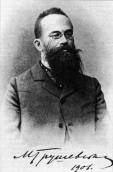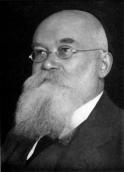Biography
Svitlana Pan'kova
Mykhailo Sergijovych Hrushevsky (17(29).09.1866; Kholm, now the town Helm, Poland – 24.11.1934; Kislovodsk, Russia) is an outstanding Ukrainian historian, specialist in literature, writer, publicist, public man, and statesman. Member of the All-Ukrainian Academy of Sciences (from 1923) and of the Academy of Sciences of the Union of the Soviet Socialist Republics (from 1929).
Mykhailo was born in the family of Sergyi Fedorovych Hrushevski graduated from the Kyiv Church Academy, an organizer of people education, the author of “The First Manual of Church-Slavonic Language”. The father’s family tree was formerly begun by Cossack’s kin Grusha, the mother was a descendant of Oputskevitchs’ family belonging to Greek-Catholic Church clergy.
M.Hrushevski graduated from a Tiflis gymnasium (1880–1886) and the History-Philology Faculty of the Kyiv Saint Vladimir University (1886–1890). In 1891–1894 he was a University professor stipendiary working for defense of history magister degree, a pupil of V.Antonovych. Under his guidance M.Hrushevs’ki prepared for a competition the study containing “An Essay of Kyiv Territory History from the Yaroslav’s Death up to the End of the ХІV Century” (1891) honored by a gold medal and as well as his magister dissertation “Bar Starostvo” (1894).
In 1894 Hrushevski came to Lviv and took a professor position of the Lviv University. At the University he became the head of the “Chair of the World History with a Special Attention to the Eastern Europe History”; it was the first chair of the Ukrainian history on Ukrainian territory working until the explosion of the World War I (1914 ).
M.Hrushevski’s scientific contacts with Lviv begun as early as in 1892. Beginning from 1893, he was a member of the Taras Shevchenko Scientific Society (ShSS) in Lviv heading it in 1897–1913. The Society directed by Hrushevski was developing as a scientific institution similar to academies in Western Europe countries; it was planned as a nucleus of the future Ukrainian Academy of Sciences. 113 tomes of the ShSS Proceedings edited by the scientist were published in 1895–1913.
M.Hrushevski initiated the activities concerning the collection of different sources of Ukrainian history; they were published in ShSS Archeographic Commission Proceedings, such as “Sources for the History of Ukraine-Rus”, “Monuments of Ukrainian Language and Literature”. In 1906 Hrushevski initiated publications of the “Ukraine-Rus Archives”. In 1898, together with О.Маkovey and І.Franko, the scientist founded and edited a magazine of literary-publicist character – the “Literary-Scientific Herald”; in 1899 Hrushevski was among organizers of the “Ukrainian Publishers’ League”.
The Seminar on History Problems of the Chair at the University and the Taras Shevchenko Scientific Society became the organization nucleus of Hrushevski’s scientific school – cradle of a pleiad of famous Ukrainian historians – V.Garasymchuk, І.Dzhydzhora, М.Коrduba, І.Кrevetski, І.Кrypiakevych, О.Теrletski, S.Тоmashovski et al.
All these large-scaled historical investigations should be a fund for the M.Hrushevski’s central work – his voluminous “History of Ukraine-Rus”. Its first volume was published in Lviv in 1898. M.Hrushevs’ki thought the publishing of such history work to be a deed of his generation honor and dignity; he worked persistently in this field without interruptions, his work conditions being often extremely unfavorable. The last, 10th volume dealing with events of 1657–1659 was printed already after the author’s death, in 1936.
The “History of Ukraine-Rus” remained unfinished, its plan being impossible to be realized during one human life. That is why, simultaneously to fundamental voluminous history work, V.Hrushevs’ki created also short one-volume essays on the Ukrainian history [“Essays on the Ukrainian People History ” (1904), “Illustrated History of Ukraine ” (1913)].
In 1897 in the newspaper “Dilo” M.Hrushevski sent a call “Let us try to get our own University!”; from this moment he headed a very long and strained struggle aiming the organization of Ukrainian Independent University in Lviv. In 1906 the scientist proposed a program concerning the foundation of Ukrainian chairs in all universities being existent in Ukraine in the power of the Russian Empire. M.Hrushevski proposed also an initiative to organize in Lviv a public association – the Society of Ukrainian Literature, Science, and Art (1904); the Society favored the development of Ukrainian culture and science supporting the creative work of Ukrainian intelligentsia in all the Ukrainian territories.
In 1905, following the revolution, the censorship in the Russian Imperia became more liberal, the Emsk Decree (forbidding publications in the Ukrainian language) having been annulated. M.Hrushevski tried to use all new possibilities and expand his scientific and public activities in russian part of Ukraine. In 1907 he was elected as the head of newly Ukrainian Scientific Society (USS) in Kyiv and edited its publications – “USS Notes in Kyiv” and “Ukraine ”. In 1907 V.Hrushevski transferred to Kyiv the editorial board of the “Literary-Scientific Herald” and printing of his own works. Due to the scientist’s initiative and participation popular illustrated magazines “Selo” (“Village”) and “Zasiv” (“Sowing”) were published in 1909–1912.
In 1907 Hrushevs’ki promoted himself for a chair manager post at the Saint Vladimir University; however, he failed to collect a necessary quantity of votes because of chauvinistic position of the University administration.
By still a student M.Hrushevs’ki (guided by O.Konys’ki and V.Antonovych) had a significant training as a public man; he worked as a leader of Ukrainian group of the Kyiv Church Seminary. During his life in Lviv belonging to the Austrian-Hungarian Empire M.Hrushevs’ki had no political rights; however, he was always interested in politics and was among organizers of the first political union in Galicia – Ukrainian National-Democratic Party (1899). In 1905–1906 he collaborated actively with Ukrainian fraction of the I and II Russian Dumas (Russian parliaments) and their organ – the “Ukrainian Herald”. He belongs to founders and members of the Rada (Council) of a Ukrainian political party in the Russian Empire – the Society of Ukrainian Progressionists (1908).
The beginning of the World War I took Hrushevski unawares during his vacations in the village of Kryvorivnya (belonging now to the Ivano-Frankivs’k district, a former Austrian-Hungarian territory). Despite of great difficulties M.Hrushevski succeeded to come back to Kyiv; however, he was here arrested becoming accused of being an austrophil. Following his staying in Lukianovs’ka prison during five months the scientist was exiled to Simbirsk. Due to cares of some outstanding Russian colleagues he received a permission to come to Kazan’, and a year later – to Moscow. Being in exile M.Hrushevski continued his scientific investigations and collaborated actively with a well-known political magazine – the “Ukrainian Life”. Only the February Revolution (1917) and the downfall of the tsarist autocracy gave M.Hrushevski the possibility to come back to Kyiv.
Following the formation of the Ukrainian Central Rada (on the beginning of the March 1917) in Kyiv, Hrushevski was elected as its President without seeing. On the 8th of April he was re-elected for this post by the All-Ukrainian National Congress in result of ballot. The Central Rada directed by an acknowledged competent leader of the Ukrainian fight for freedom passed quickly its way from slogans of national cultural autonomy to proclamation of sovereign Ukrainian Popular Republic (in January 1918) and its Constitution (in April 1918). Hrushevski was the author of principal political documents of the UCR and of fundamental conceptions of the Ukrainian revolution. He collaborated closely with the Ukrainian Party of Socialists-Revolutionists formed in the April 1917.
Following the hetmanic upheaval Hrushevski stopped his political activity. In 1919–1924 he lived as an emigrant (in Prague, Paris, Geneva, Berlin, Vienna). The investigator’s scientific and publishing activities were concentrated in the Ukrainian Sociological Institute organized by himself, his political work having become the guidance by the “Abroad Delegation” of the Ukrainian Party of Socialists-Revolutionists, editing its organ “Boritesia – Poborete!” (“Struggle – and you will win!”), organization of the Committee aiming to help Ukrainian citizens suffering from Hunger (“Golodnym Ukrayiny”).
During his emigration life, M.Hrushevski began to work upon one more extensive scientific project – the voluminous “History of the Ukrainian Literature”. Its first volumes were printed in 1923, the last one (the 6th volume) dealing with the literature of the first third of the 17th century existed during a very long time as a manuscript and was printed only in 1995.
In March 1924 M.Hrushevski came back to Ukraine in order to continue its large-scaled scientific investigations and to complete his fundamental “History of Ukraine-Rus” being impossible without home archives and library collections. From any objective point of view, the investigator’s scientific and scientific-organizational activities were a marked opposition to the Bolshevik regime in Ukraine. In 1924-1930 he headed all the main institutions of the All-Ukrainian Academy of Sciences concerning historical investigations: the Chair of the Ukrainian People History of the History-Philology Division, History Section with numerous commissions, Archeography Commission. The newly Chair of Scientific Investigation of the Ukrainian History became the center of the Hrushevs’ki school. 80 books were published during this period edited by M..Hrushevs’ki including periodical and series works such as “Ukraine”, “Scientific Collection”, “Studies in the Ukraine’s History”, “During a Century”, collections of commissions including data of Ukrainian historical investigations in different Ukraine regions.
In 1929 M.Hrushevski became a member of the Academy of Sciences of the Union of Soviet Socialist Republics.
In the end of 1930, the abolition of all commissions of the Historical Section of the Academy of Sciences and of all its publishing organs crowned the merciless elimination of organizational structure and high quality staff of all scientific institutions headed by M.Hrushevs’ki. In 1931–1934 the scientist remained only the chief of the Chair of Ukrainian People History of the Trade Capital Period. During these years he became a target of merciless “shaft critics” (more precisely, a target of baiting) inspirited and directed by Bolshevik authorities. “Critics” in civil clothes did not chose words and expressions accusing the great scientist of numerous different scientific and political “sins”.
On the beginning of the March 1931 Hrushevski was forced to move to Moscow; this leaving for Moscow was said to be a scientific mission; in fact, however, it was a honorary exile. Data from archives’ sources suggest the scientist to be supervised by GPU-NKVD organs beginning from his first days following his return to Ukraine; he was imprisoned in the March 1931 following a forged accusation as a leader of the so-called Ukrainian National Center (UNC). Shortly after inquests in Kharkiv M.Hrushevski was released. No open legal UNC process had place. We possess now no documents permitting to understand without any doubt all the circumstances and motifs of the scientist’s liberation.
In 1931–1934 M.Hrushevski lived in Moscow being always under continuous supervision of Bolshevik government secrete service organs. He was working with the 10th volume of the “History of Ukraine-Rus” prepared later for publication and published posthumously by his daughter Kateryna on the beginning of 1937. M.Hrushevski died in Kislovodsk after a series of surgeon procedures and buried on Baykov cemetery in Kyiv.
Although Hrushevski was not repressed “in legal form” by the Soviet authorities, his works were never re-edited until the complete end of the Soviet era in 1991; Hrushevski’s books were continuously exempted from libraries and burnt or sent to special store-houses; his name was steadily ignored or, if it was impossible, profaned by such tabs, as “enemy of the Ukrainian people”, “Ukrainian bourgeois nationalist”, “Austrian-German spy”, “falsifier of the Ukrainian history”. During this period, the scientific legacy of Hrushevski was not studied, no references of earlier published and not forbidden works being not permitted.
This Soviet academician was honored in such a way by the Soviet authorities because of his being incarnation of Ukraine aspiration for independent state existence.
Only in independent Ukrainian state it has become possible to examine impartially the person of Mykhailo Hrushevski and to evaluate properly his deed in Ukrainian science and state organization, to publish his works, and to honor his memory. Our site is to be our feasible contribution to this sacred cause.



